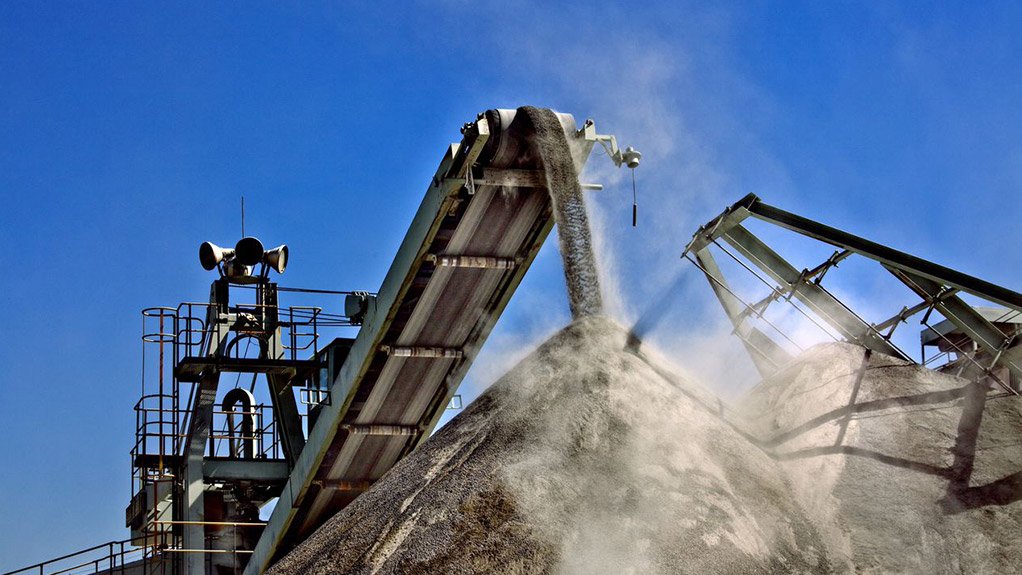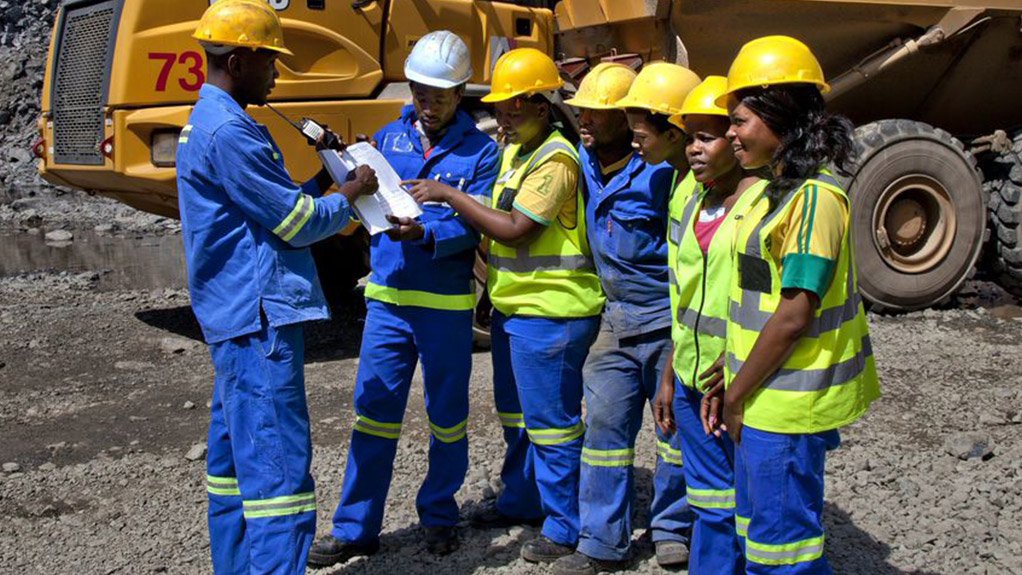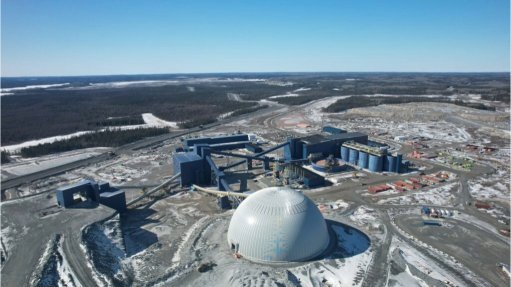Quarrying operations increase materials supplier’s revenues



REAPING THE REWARDS The Glen Douglas quarry produced about 1.8-million tons of metallurgical dolomite last year
LEARNING THE ROPES Afrimat’s skills development division trains about 100 people a year, taking on about 30 artisan and engineering interns
Despite the challenging economic climate currently impacting on the mining and construction sectors, JSE-listed construction materials and industrial minerals supplier Afrimat achieved a year-on-year revenue growth of 42.1% for the company’s 2013 financial year, which ended February 28.
In 2013, the group’s revenue amounted to R1.9-million, up from the 2012 financial year, when the company recorded a gross turnover of R1.3-million.
In addition to “excellent profits in light of improved market conditions”, another significant contribution to the success of Afrimat’s mining and aggregates division was the first-time inclusion of resources group Infrasors in the full-year results, according to the company’s reviewed condensed provisional consolidated financial results for the 2013 financial year.
In February 2013, Afrimat acquired 50.7% of Infrasors’ gross shares in issue, thereby strengthening the group’s foothold in the industrial minerals sector and further expanding its geographical reach in South Africa.
Afrimat acquired an additional 28.9% during the 2013 financial year, increasing the company’s shareholding in Infrasors to 79.6%.
Afrimat CEO Andries van Heerden tells Mining Weekly that all its processing plants are fully operational and well placed to satisfy market demand, which should assist in sustaining revenue earnings going forward.
He adds that Afrimat’s flexible service delivery model, which is supported by mobile equipment units, positions the group to take advantage of opportunities “as and where they arise”.
“We supply a range of materials, including, but not limited to, aggregates, limestone, metallurgical dolomite and alluvial silica. Afrimat’s diverse range of high-quality materials is another important reason for our successful operations.”
Van Heerden also points out that Afrimat performed well in the rest of its business operations, particularly in its aggregates, block and brick division, which grew by 37% year-on-year after three difficult years.
Afrimat’s industrial minerals business division also recorded about 30% year-on-year growth, he adds.
African Ambitions
Van Heerden tells Mining Weekly that, although the group is predominantly South Africa-focused, it is also considering opportunities in neighbouring countries. The company has established one quarry in Namibia to date.
He admits, however, that the performance of Afrimat’s Aris aggregate stone quarry, just south of Windhoek, has been “somewhat disappointing to date”.
Nonetheless, Van Heerden stresses that Afrimat is committed to expanding its operations into other neighbouring countries through the group’s business development team, whose mandate is to continue to seek business opportunities in South Africa and the rest of Africa and to evaluate new opportunities.
Afrimat group subsidiary Afrimat Contracting International, which supplies mobile drilling, blasting, crushing and screening services, is also responsible for expanding the group’s footprint in neighbouring countries.
Van Heerden tells Mining Weekly that the subsidiary is evaluating several opportunities, but adds that he currently cannot disclose any information pertaining to the status of these opportunities.
Local Operations
Afrimat’s largest quarry, the Glen Douglas openpit metallurgical dolomite quarry, located in Meyerton, south of Johannesburg, grew by about 30% year-on-year, having produced about 1.8-million tons of metallurgical dolomite last year.
Van Heerden notes that the quarry has about 70 years of proven reserves left.
He highlights that a multimillion-rand plant upgrade to the Glen Douglas dolomite mine was commissioned during the third quarter of the 2013 financial year, which successfully increased the quarry’s production output.
Afrimat also commissioned the Durbanville aggregates quarry in March 2013, which is now fully operational.
Skills Development and Training
Van Heerden tells Mining Weekly that Afrimat – which employs about 2 500 people – has introduced several skills development programmes in the last six years.
“We have our own skills development division that trains about 100 people a year, 30 of whom are artisan and engineering interns,” he states.
The company also provides in-house training at its skills development centre, which is located at Afrimat’s regional office, in Worcester, in the Western Cape.
However, the company’s training division operates throughout South Africa and it sends its staff to accredited training providers when required.
Van Heerden notes that the Afrimat group also provides yearly bursaries for ten final-year mechanical, electrical and mining engineering students who are employed by the company on completion of their studies.
Safety Record
Van Heerden enthuses that, during the 2013 financial year, Afrimat recorded its best-ever safety record.
“We recorded a lost-time injury-frequency rate (LTIFR) of about 1.3 for every million hours worked.”
He says that the LTIFR has dropped significantly over the last five years, owing to the commitment of the group’s management team and its employees, “who have ensured that the highest levels of safety procedures are practised”.
Van Heerden adds, however, that it is not only senior management who has played its part in improving the group’s LTIFR.
“To ensure that safety is a key priority for Afrimat’s operations, it is an ethos that we have inculcated throughout the workforce – from the most junior to the most senior members of staff.
“Our employees understand that they must take responsibility for their actions and are reminded of this on a daily basis. If they are negligent in ensuring that safety standards are adhered to, then they are likely to cause harm – not only to themselves but also to their colleagues,” he concludes.
Comments
Press Office
Announcements
What's On
Subscribe to improve your user experience...
Option 1 (equivalent of R125 a month):
Receive a weekly copy of Creamer Media's Engineering News & Mining Weekly magazine
(print copy for those in South Africa and e-magazine for those outside of South Africa)
Receive daily email newsletters
Access to full search results
Access archive of magazine back copies
Access to Projects in Progress
Access to ONE Research Report of your choice in PDF format
Option 2 (equivalent of R375 a month):
All benefits from Option 1
PLUS
Access to Creamer Media's Research Channel Africa for ALL Research Reports, in PDF format, on various industrial and mining sectors
including Electricity; Water; Energy Transition; Hydrogen; Roads, Rail and Ports; Coal; Gold; Platinum; Battery Metals; etc.
Already a subscriber?
Forgotten your password?
Receive weekly copy of Creamer Media's Engineering News & Mining Weekly magazine (print copy for those in South Africa and e-magazine for those outside of South Africa)
➕
Recieve daily email newsletters
➕
Access to full search results
➕
Access archive of magazine back copies
➕
Access to Projects in Progress
➕
Access to ONE Research Report of your choice in PDF format
RESEARCH CHANNEL AFRICA
R4500 (equivalent of R375 a month)
SUBSCRIBEAll benefits from Option 1
➕
Access to Creamer Media's Research Channel Africa for ALL Research Reports on various industrial and mining sectors, in PDF format, including on:
Electricity
➕
Water
➕
Energy Transition
➕
Hydrogen
➕
Roads, Rail and Ports
➕
Coal
➕
Gold
➕
Platinum
➕
Battery Metals
➕
etc.
Receive all benefits from Option 1 or Option 2 delivered to numerous people at your company
➕
Multiple User names and Passwords for simultaneous log-ins
➕
Intranet integration access to all in your organisation



















